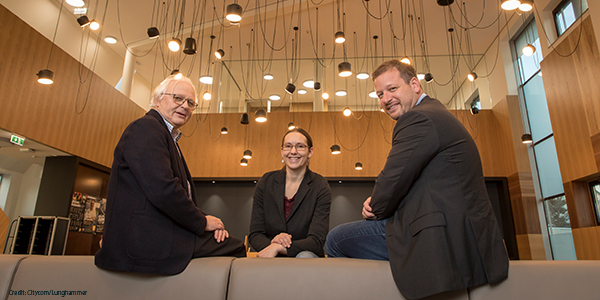Experts from science and industry discussed it at WeITblick, part of the Citycom series of talks. Digital vs analogue, automated instead of manual – from a purely technical point of view, it is clear what is meant by digitalization. What about the organizational level?
Viktoria Pammer-Schindler (Know-Center and TU Graz): On the one hand, digitalization can be a driver of change, that is, one adapts one’s business models to the digital world. On the other hand, digitalization can also be part of the solution, so that one reacts with digitalization based on changes in the world. However, digitalization is not a miracle cure. Often it is simply about reorganizing the work.
Igo Huber (ICT service provider Citycom): Digitalization can increase efficiency, but it also has a disruptive aspect. These are two entirely different things. Efficiency concerns the technical component. However, digitalization can only have a disruptive effect if top management makes it happen. Management then faces the decision to become either Digital Leader or Digital Loser.
However, it is also relevant that employees are afraid of losing their jobs through digitalization …
Ralf Parfuss (IoT expert t-matix solutions): For most companies, in my experience, the focus is on people. It’s about finding digital solutions that make it easier for people to do their jobs. A maintenance employee has much less stress when errors are automated and reported early.
What concrete steps should be taken from a management perspective?
Parfuss: Clear resource allocation! Often, true to its motto “just quickly do Industry 4.0”, the topic is delegated to an employee. At the beginning of the 2000s, the IT department was the most important, then the tides turned. This needs to be reversed again. The IT department must be at the forefront so that new models can be developed across all departments.
The path to digitalization must be steered by the highest level of the company, Igo Huber (Citycom), Veronika Pammer-Schindler (Graz University of Technology and Know-Center) and Ralf Parfuss (t-matix solutions) are convinced.
Of course, it also needs the right conditions …
Parfuss: There is still a lot to be done in education. We find it extremely difficult to find specialists with IT skills.
Huber: With regard to infrastructure, there is also a need for action due to exploding data volumes. We as Citycom are working on a separate LoRa network for Graz. LoRaWAN is a low-powered WLAN protocol developed for Internet of Things communication. We will be in urgent need of these kinds of networks in the near future.
About the panelists:
Igo Huber is Managing Director of the Graz ICT service provider Citycom in Graz, which among other things, offers the innovative data center solution, Knox Data.
Ralf Parfuss is Managing Director of t-matix solutions, which has developed an IoT platform. Customers include among others, CATERPILLAR, Garmin, STRABAG, AVL, Zodiac, Pewag, …
Viktoria Pammer-Schindler is Assistant Professor at Graz University of Technology and Head of Ubiquitous Personal Computing at Know-Center, one of Europe’s leading Big Data research centers.
